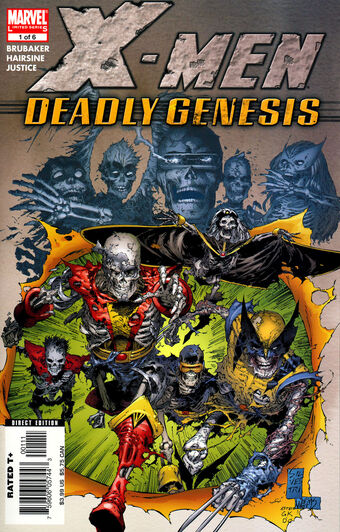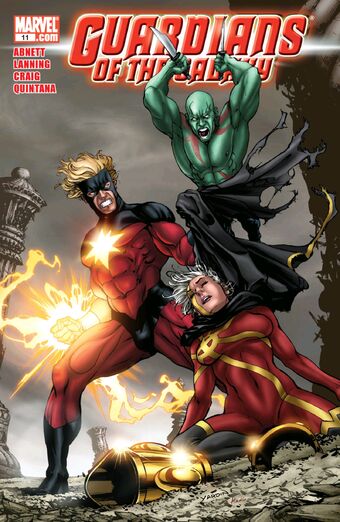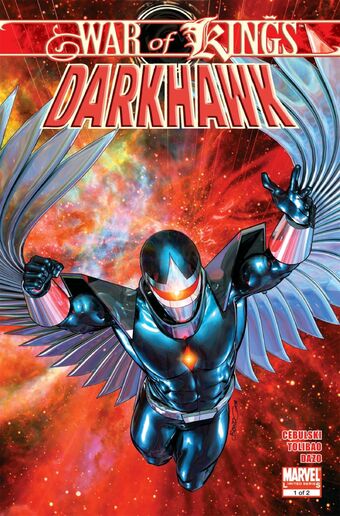Before the Guardians of the Galaxy movie became a world-wide hit in 2014, most casual fans didn’t realize that Marvel Comics contained thousands of colorful panels of amazing “cosmic” characters and stories.
Sure, casual fans likely had a passing understanding that Iron Man or Captain America sometimes battled aliens. And they likely ascertained that Thor didn’t grow up in Spider-Man’s friendly neighborhood. But most had their minds blown by the likes of Rocket Raccoon and Groot, characters that they likely didn’t realized even existed before the GotG movie.
In fact, Marvel Comics has a galaxy of characters rivaled perhaps only by the Star Wars franchise. To showcase many of the characters, Marvel published a trilogy of cosmic comics in the 21st century. We’ve covered Annihilation and Annihilation: Conquest.
Now we’ll take you issue-by-issue through the third storyline in that trilogy of Marvel cosmic-themed comics: War of Kings.
Marvel Cosmic Reading Order: War of Kings
Less a sequel to Annihilation and more a remix of the old school Avengers Operation Galactic Storm, War of Kings was a big cosmic event that featured a team of X-Men, their space-trotting allies, the Starjammers, the Kree, the Inhumans, and the third Summers brother. As if that wasn’t enough, it brought in Nova and the Guardians of the Galaxy, then added a Darkhawk origin story retcon for good measure.
The reading order for War of Kings is an absolute mess. It’s such a mess that I can’t make heads nor tails of it myself and I’m a shameless Marvel Zombie who has read the event twice.
Here’s the official order outlined in Marvel Unlimited, Marvel’s digital app:
- X-Men: Kingbreaker #1
- Guardians of the Galaxy (2008) #8
- Secret Invasion: War of Kings #1
- X-Men: Kingbreaker #2
- Guardians of the Galaxy (2008) #9
- War of Kings: Darkhawk #1
- Guardians of the Galaxy (2008) #10
- X-Men: Kingbreaker #3
- War of Kings #1
- Guardians of the Galaxy (2008) #11
- War of Kings: Darkhawk #2
- X-Men: Kingbreaker #4
- Guardians of the Galaxy (2008) #12
- Nova (2007) #23
- War of Kings #2
- War of Kings: Ascension #1
- Guardians of the Galaxy (2008) #13
- Nova (2007) #24
- War of Kings #3
- War of Kings: Ascension #2
- Guardians of the Galaxy (2008) #14
- Nova (2007) #25
- War of Kings #4
- War of Kings: Savage World of Sakaar One-Shot
- War of Kings: Ascension #3
- Nova (2007) #26
- Guardians of the Galaxy (2008) #15
- War of Kings #5
- War of Kings: Warriors #1
- Guardians of the Galaxy (2008) #16
- Nova (2007) #27
- War of Kings: Ascension #4
- War of Kings #6
- Wars of Kings: Warriors #2
- Nova (2007) #28
- War of Kings: Who Will Rule? One-Shot
If you are confused by that reading order, you aren’t alone. It’s a mess. What’s worse is it’s incorrect. This is the official reading order from Marvel Unlimited, yet I had to consistently double-check the inside page summarizations to make sure I was tracking with the event.
I found a better reading order on another site and I want to give them full credit by pointing you there, rather than pasting their hard work into this article. It’s also a reading order that highlights the comics that serve as an important prelude to War of Kings. I’ll wait while you give it a read, then I share some thoughts on some of the major elements of the event.
War of Kings: Prologue Reading
So, you now have the scope of the story and the individual titles and characters who are involved. Let’s dig in a bit more.
X-Men: Deadly Genesis

Marvel had teased a “third Summers brother” for decades, but the Deadly Genesis miniseries finally introduced Gabriel Summers aka Vulcan, the brother of Cyclops and Havok. The bad news? It’s absolutely horrible.
The usually sure-handed Ed Brubaker dropped a poo, and there is no more polite way to say that. In introducing Vulcan, the Deadly Genesis miniseries retconned the origin story of the X-Men in a wholly unsatisfying way.
The problem for War of Kings is that Vulcan is the central character of the event and his actions drive the plot. Still, you should skip it. You only need to know this: Vulcan is a character with poorly defined powers who is driven to insanity by his hatred and need for revenge on the X-Men.
If you allow yourself to be frustrated that Vulcan is a poor character, it will ruin the event for you. But if you go into it seeing him as a mere plot device, it works fine.
My recommendation: Skip it.
Uncanny X-Men: Rise and Fall of the Shi’ar Empire
This is another collection of comics that serves as prologue but it’s helpful to be able to track what is going on early. Alas, Rise and Fall of the Shi’ar Empire is another stinker from Ed Brubaker. It’s a 12-parter but it’s easily obtained, as it appeared in the main Uncanny X-Men title in issues #475-486.
The X-Men, Starjammers, and Shi’ar go way back, so it’s not a complete loss. The action is great, for example. On the other hand, the character work here is abysmal and readers are never quite aware of what exactly Vulcan’s plan is. But on the other other hand, there are mutants in starships, which will never be a total loss.
My recommendation: Probably don’t read it?
Guardians of the Galaxy (2008) #8-16

I agree with Comic Book Herald that GotG are better read as prelude comics, rather than trying to figure out the reading order of how they are sprinkled throughout the event. Regardless, read them!
I’ve written about this series before in regards to Annihilation and Annihilation: Conquest and I’ll likely say more about it in the future, because it is absolutely excellent. It’s the series that served as the template for the Guardians of the Galaxy movies in the MCU, so don’t think about skipping it.
My recommendation: Read it!
X-Men: Kingbreaker
If you skipped Rise and Fall of the Shi’ar Empire, you’ll have no idea what is going on in X-Men: Kingbreaker, except that the cover pretty much sums up the entire plot. Vulcan has captured Havok and is wont to gloat. Havok plots an escape because he breaks kings, I guess?
But I don’t blame writer Christopher Yost, who is excellent, it’s just collateral damage from the kooky publishing flowchart of the entire event.
On its own, Kingbreaker is pretty darned entertaining, as a comic that features Polaris, Havok, and the Starjammers would. Definitely give it a read if you are a completionist who is going all in on the event. But skip it if you are comfortable skipping all the prelude and supplementary reading.
My recommendation: Read it?
War of Kings: Actual Event Reading
War of Kings: Darkhawk | War of Kings: Ascension

Unless you enjoy entire issues of “Fight the one trying to take control of you!” then you can skip this one. Just be comfortable that Darkhawk(s) will show up out-of-the-blue, yet ultimately have little bearing on events.
Worse, the story continues in War of Kings: Ascension, which begs the question of why Marvel didn’t just streamline the whole Darkhawk sub-plot into a single title.
I just finished reading War of Kings: Ascension and I can’t even recall what happened or why it matters. That doesn’t seem like a great sign, does it?
With the story starting on Earth, then moving to space, this was an obvious attempt to bring ’90s bad boy Darkhawk back into mainstream popularity in the Marvel universe. To do this the writers vastly expanded the origin story of Darkhawk, tying him into the history of the Shi’ar as a sort of secret kingmaker.
It didn’t work and the attempt didn’t take. As far as I know, the plotline hasn’t been picked up since and it matters little to the main War of Kings storyline.
My recommendation: Skip them.
War of Kings
This is the 6-issue series that serves as the tentpole for the story. Written by Dan Abnett and Andy Lanning, who contributed to Annihilation and Annihilation: Conquest before it, it’s well-written with snappy dialogue and good action.
A intergalactic war makes for good entertainment, particularly when it features superhero teams as the combatants. The Shi’ar Imperial Guard have always been a fan-favorite niche team. The Starjammers are even more of a fan-favorite, so their inclusion as guerrilla warfare combatants is fun as heck, particularly paired up with Polaris and Havok. And the Inhumans? Well, they are there.
Abnett and Lanning made the best of a bad situation overall. I mentioned that Vulcan is a lame character and that never improves. Nor does really anyone ever care about the Inhumans outside of Crystal. As a result, a reader doesn’t care about the outcome of the, you know, war. Although the whole outcome of War of Kings is a throwaway, the action is fun, so it’s a definite win overall.
My recommendation: Read it.
War of Kings: EVERYTHING ELSE

Outside of the Nova series, my recommendation is to skip the other tie-ins and one-shots, even if you could figure out the reading order and how they fit into the overall narrative.
If it seems like I’ve been hard on War of Kings, then you’ve accurate guessed my feelings. War of Kings doesn’t live up to Annihilation or even Annihilation: Conquest. But while I wouldn’t recommend it independently, I certainly recommend War of Kings as the good reading as the third part of the trilogy.
I also like what they attempted to do. It was clever to bring the Shi’ar into the mix, as that was a plausible way to introduce the X-Men, Imperial Guard, and Starjammers into this Marvel cosmic trilogy. Sadly, Vulcan was a poor antagonist and in no way carried the event.
Likewise, it was smart to get the Inhumans off the moon and back into Kree affairs, but despite Marvel’s obvious desire to bring the Inhumans to the center of Marvel events, they just aren’t interesting outside of Crystal and the lovable Lockjaw. “I speak for my husband!” Yeah, Medusa, we get it already.
Nova and Guardians of the Galaxy continue their incredible run with Dan Abnett and Andy Lanning at the helm. Unless you wan to go all in, I recommend reading the main War of Kings title along with Nova and GotG. Skip the rest unless you are really a Darkhawk fan or an X-Men completionist.

